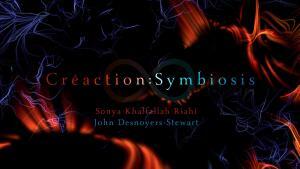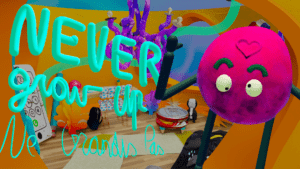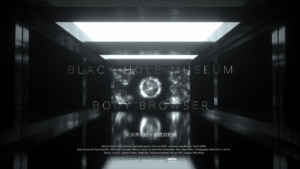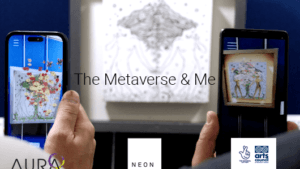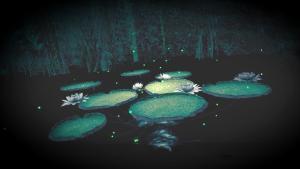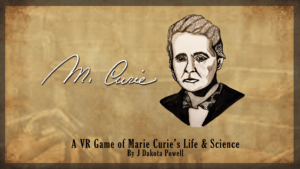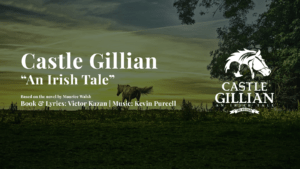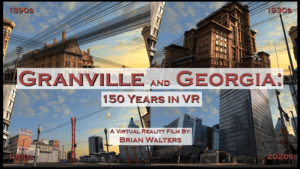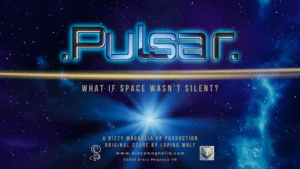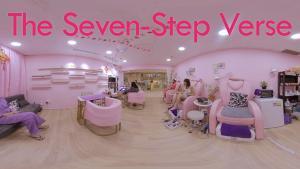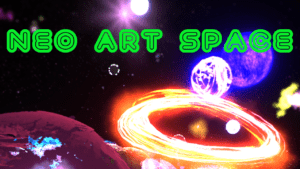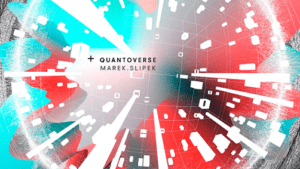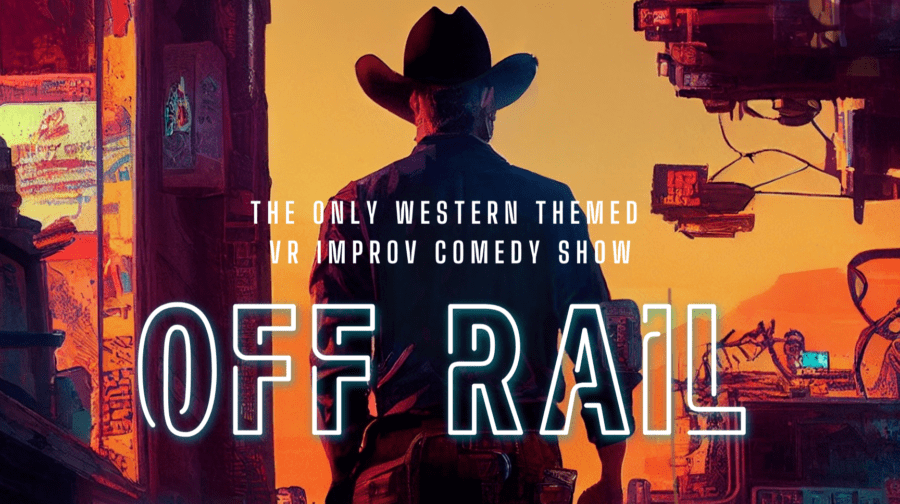
FIVARS Fall 2022 Spotlight: OffRail creators interview
The world’s greatest VR comedy improvisers from productions that include “The Under Presents” and “Dr. Crumb’s School for Disobedient Pets” come together for a rumination on the role of the performing artist in a future dominated by AI, and offer the audience the most agency of any VR live performance to date, as they follow you…“OffRail.” Here is the complete cast and crew list for the show
To get a sense of what we are discussing today: Check out the OffRail trailer
FIVARS had a chance to speak with director Ari Tarr and OffRail’s production team.
What lead to the creation of this piece?
 Ari Tarr, Founder, Creative Director: I created my first VR live comedy improv show in 2015 with the GearVR, as a parody on the over-hyped VR industry. This bit became reality when I joined the first VC accelerator funding VR startups with an “Uber for Actors” pitch for the coming metaverse. “Meta” has made socialVR back into a grift again lately, and it’s unfortunate that I need to tell my VR theater students that there is not currently a market to make XR performing a full-time profession for someone who wants to “break into the industry.”
Ari Tarr, Founder, Creative Director: I created my first VR live comedy improv show in 2015 with the GearVR, as a parody on the over-hyped VR industry. This bit became reality when I joined the first VC accelerator funding VR startups with an “Uber for Actors” pitch for the coming metaverse. “Meta” has made socialVR back into a grift again lately, and it’s unfortunate that I need to tell my VR theater students that there is not currently a market to make XR performing a full-time profession for someone who wants to “break into the industry.”
When I started, VC Tech investment funding was the only way to develop for this technology. When the hype bubble burst soon after, most fled while a small community of people truly passionate about XR stayed and continued to iterate and explore the new medium.
Since seeing the DK1 I have been a believer that this new medium allows us to scale deeply empathic human experiences, and since being a co-founder I have consulted for many VR companies attempting to make live immersive shows in XR. Along the way, I’ve been lucky enough to perform with a very small select group of people with professional performing careers IRL, and who now from shows like The Under Presents, Adventure Lab and OnboardXR also have years of experience applying those skills to the medium of XR.
Performing with these people over and over again, I wanted to build on the brilliant unique moments I saw them create. I created this specific show for this super-friends cast of uniquely talented improvisers to challenge us as an ensemble to create an amazing cohesive show that gives the most agency to an audience of any previous VR show ever!
Other inspirations for this piece include the announcement of the DisneyLand theme park “Metaverse,” and the recent AI art wave and its relationship to the artists – both those whose work is used in the AI training data and those whose livelihoods are threatened by AI-generated art.
What was the production process for you and your team? What did you learn?
 Jesse Fernandez, writer: Like all futurists, we tend to think ahead of our time — so far ahead in this case that we planned for technology that won’t be invented for decades (if ever). But we also knew that broken, unfinished things can be hilarious, so as we built our Tower of Babel, we used the tumbling parts of the tower as yet more props for our comedic improv. Through this process, we came to a better understanding of which glitches are deal-breakers, and which only look that way until you start playing with them.
Jesse Fernandez, writer: Like all futurists, we tend to think ahead of our time — so far ahead in this case that we planned for technology that won’t be invented for decades (if ever). But we also knew that broken, unfinished things can be hilarious, so as we built our Tower of Babel, we used the tumbling parts of the tower as yet more props for our comedic improv. Through this process, we came to a better understanding of which glitches are deal-breakers, and which only look that way until you start playing with them.
How did you become an immersive media content creator and why?
Ari: As a show biz kid I got to go on tour sometimes, but mostly my parents were on the road. When I read Neal Stephensons’ The Diamond Age, I was fascinated by the SciFi depiction of professional actors of the future using VR to perform around the world without needing to leave their homes.
I got my degree in acting with an emphasis on multimedia installation design and physical theater that included masks and puppetry. I started making a career in the Bay area creating interactive characters and installation design for corporate clients like DisneyLand, launch events for Google and Facebook, and festivals like EDC and Burning Man.
In 2014 I was creating large-scale interactive projection-mapped installations and live generative motion capture animation, but when I first saw VR from my colleagues, I saw it as the way to share my work around the world without the massive costs associated with IRL immersive event production. I saw that it would be a way for me to work around the world while avoiding constant travel, allowing me to have a stable home life.
I am so grateful to report that though the transition to being a working citizen of the metaverse is still as financially as unstable as ever, I have been managing to make a living as a full-time “XR Actor.” I hope to expand the market so that more performing artists who are passionate about XR, or limited in a way that makes it an accessible outlet, can have a reliable income from these performances.
What is the VR/AR industry like in your region?
Ari: The company is based mostly in LA/NY. I’m lucky that I am surrounded by people with similar interests, but because I’ve traveled so extensively, my team is curated from all over the US and the UK.
 David Gochfeld, Co-Director: Because we rehearse and perform in VR, we can be anywhere. It’s not clear that there is a “VR industry” per se: VR is a technology that is being adopted by many different industries, and the practitioners working with VR come at it from many different backgrounds. And unlike most traditional industries, it doesn’t owe anything to geography, so it can’t be characterized by region.
David Gochfeld, Co-Director: Because we rehearse and perform in VR, we can be anywhere. It’s not clear that there is a “VR industry” per se: VR is a technology that is being adopted by many different industries, and the practitioners working with VR come at it from many different backgrounds. And unlike most traditional industries, it doesn’t owe anything to geography, so it can’t be characterized by region.
What do you have planned for the future?
 Nithia, Production Manager: We are looking to tap into the current VR Theatre communities, those who are passionate about what they do, to guide us towards achieving a larger, more mainstream audience. We want to transform VR Theatre into a viable market, where people can and do make their living performing for massive audiences around the world.
Nithia, Production Manager: We are looking to tap into the current VR Theatre communities, those who are passionate about what they do, to guide us towards achieving a larger, more mainstream audience. We want to transform VR Theatre into a viable market, where people can and do make their living performing for massive audiences around the world.
What would you like to share with fellow content creators and/or the industry?
Ari: I had the pleasure of training Max Maliga and Genevieve Flati as hosts for Adventure Lab’s VR experience Dr. Crumbs School for Disobedient Pets, which was a delight as they both have amazing careers as professional improvisors, actors (and puppeteers!).
Since then, I’ve taught VR theater courses and workshops at NYU with Dasha Kittredge, who co-manages an immersive production company that creates immersive installations with the biggest brands in Hollywood. Kevin Laibson teaches and performs improv in NY, and, like myself, already had been performing live improv in VR for several years before the release of the Quest in 2019, along with our Director David Gochfeld – a pioneer of VR theater with a background in clown and physical performance. Finally, Mandy Canales is a phenomenal sketch teacher and has a wealth of experience with the VRChat improv community. Mandy was the one who convinced me that VRChat was a good platform to bring our improv comedy show, (which also allowed our developer Boom to push new iterations at incredible speeds).
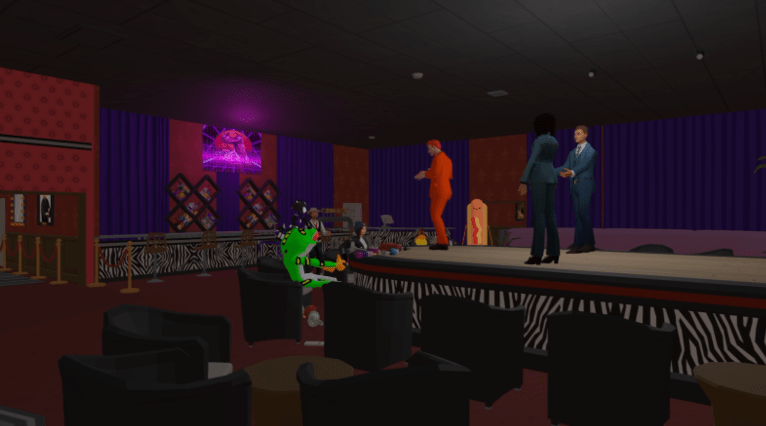
Besides the growing VR immersive theater community, there is also a growing VR improv comedy community. I have a small group of pro improvisers who have gained years of experience performing in live VR, and if I were you, I’d find their shows, become fans, hire them, etc.
I want us to grow and intertwine all of our communities, make the metaverse a better place, and together, let’s create some of the funniest, most engaging, most impactful performances in the world — virtual or otherwise.
Do you think VR festivals like FIVARS are important?
FIVARS and festivals that follow in its footsteps are indispensable to the immersive media ecosystem. These festivals are a major way that new talent in the immersive space can be recognized for their contributions to this art form and receive exposure so that their works and talents can be appreciated and utilized by the world at large.

